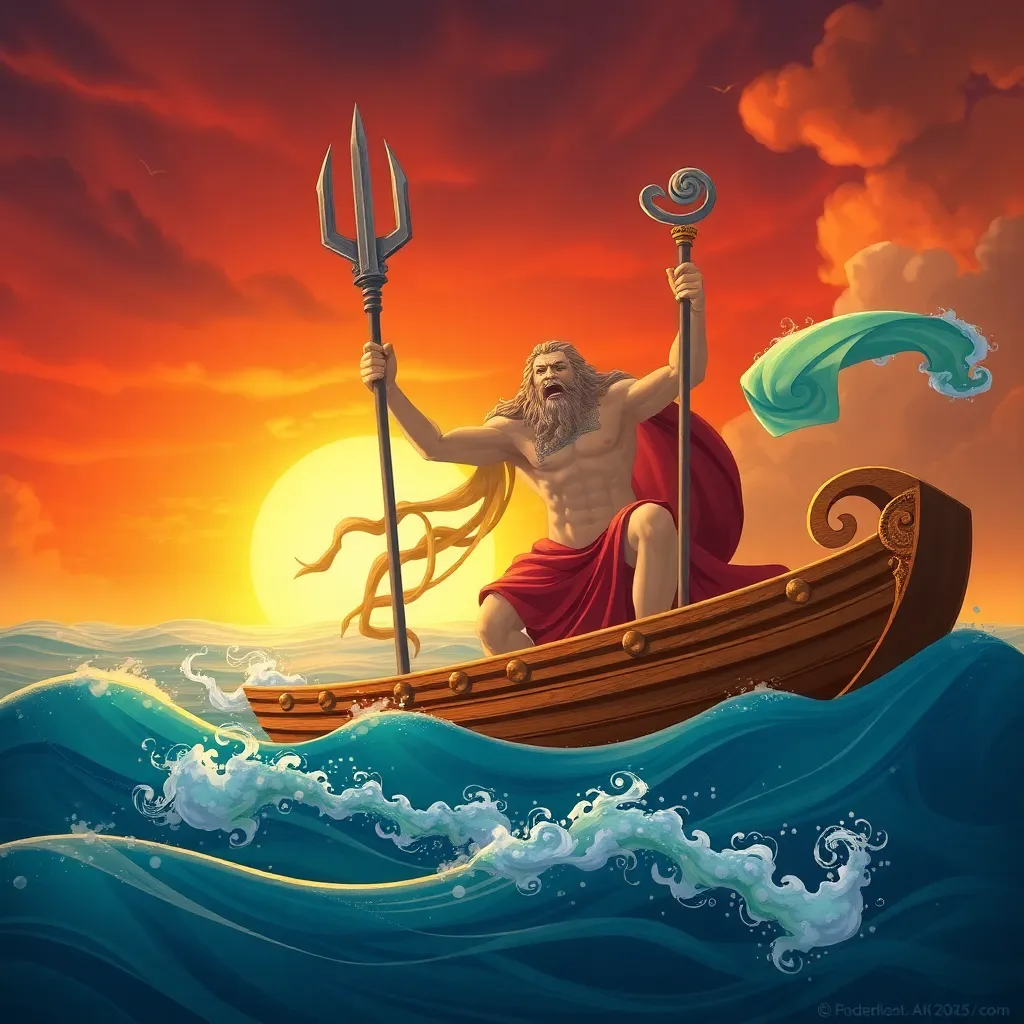Poseidon’s Role in the Odyssey: A Look at His Influence on Odysseus
I. Introduction
“The Odyssey,” attributed to the ancient Greek poet Homer, is a cornerstone of Western literature that chronicles the arduous journey of Odysseus as he strives to return home following the Trojan War. This epic poem explores themes of heroism, loyalty, and the struggle against divine forces. Central to Odysseus’s trials is Poseidon, the god of the sea, who plays a pivotal role in shaping the hero’s journey.
Poseidon, known for his tumultuous temperament and dominion over the oceans, significantly influences the narrative through his wrath and challenges. Thesis statement: Poseidon plays a crucial role in shaping Odysseus’s journey, influencing his trials and tribulations throughout the epic.
II. The Origins of Poseidon’s Anger
Understanding Poseidon’s anger towards Odysseus requires delving into the events that precipitated this wrath. The catalyst for Poseidon’s fury was the blinding of Polyphemus, the Cyclops and one of Poseidon’s sons. When Odysseus and his men become trapped in Polyphemus’s cave, Odysseus devises a cunning plan to escape by blinding the giant. This act of violence not only endangers his crew but also invokes the vengeance of Poseidon.
The implications of disrespecting a god in Greek mythology are profound. Greek culture held reverence for the gods, and any act of hubris—excessive pride or defiance against divine authority—was met with severe consequences. Odysseus’s failure to show humility to Poseidon sets the stage for a tumultuous journey filled with peril.
III. Poseidon as an Antagonist
Throughout “The Odyssey,” Poseidon’s wrath is a formidable force that hinders Odysseus’s progress. His anger manifests in various forms, primarily through treacherous storms and shipwrecks that threaten the hero’s quest for home.
- Storms: Poseidon conjures violent seas that toss Odysseus’s ship and crew, making navigation perilous.
- Shipwrecks: Many of Odysseus’s men perish as a result of Poseidon’s wrath, illustrating the danger of the sea and the god’s power.
The symbolism of the sea in Greek mythology represents both the unknown and the uncontrollable aspects of life. Poseidon’s influence serves to highlight the fragility of human endeavors against divine forces.
IV. Odysseus’s Struggles Against Divine Forces
Odysseus’s journey is fraught with challenges, many of which are direct consequences of Poseidon’s anger. This divine influence complicates Odysseus’s quest for home, emphasizing the interplay of fate and free will. While Odysseus is a clever and resourceful hero, he often finds himself at the mercy of the gods.
Key trials that illustrate Poseidon’s power include:
- The encounter with the Laestrygonians, who destroy Odysseus’s fleet at the behest of Poseidon.
- The temptation of the Sirens, where Odysseus must rely on his cunning to survive the allure of their song, representing the distractions that can lead one astray.
These trials emphasize the theme of divine intervention and the struggle against fate, showcasing how the gods dictate the lives of mortals.
V. The Theme of Hubris
Odysseus’s character flaws, particularly his hubris, play a significant role in escalating his conflict with Poseidon. His pride leads him to reveal his identity to Polyphemus after blinding him, a critical error that seals his fate under Poseidon’s anger.
Key points include:
- Odysseus’s Pride: His self-confidence and desire for glory often cloud his judgment.
- Consequences: Each act of hubris results in further trials, illustrating the Greek belief that pride invites downfall.
The moral lessons derived from Odysseus’s encounters with Poseidon serve as a cautionary tale about the dangers of arrogance and the necessity of respecting divine powers.
VI. Divine Intervention and Support
While Poseidon serves as an antagonist, other gods, like Athena, provide Odysseus with much-needed support throughout his journey. Athena’s guidance contrasts sharply with Poseidon’s wrath, showcasing the duality of divine influence in human affairs.
Key aspects include:
- Athena’s Favor: She helps Odysseus with wisdom and strategic counsel, often intervening to protect him from Poseidon’s fury.
- Divine Favor: The interplay of support and opposition from different gods illustrates the complexity of Greek mythology and the unpredictable nature of divine intervention.
This dynamic underscores the theme that human success often hinges on both individual merit and the favor—or wrath—of the gods.
VII. The Resolution of Conflict
Ultimately, Odysseus’s journey leads to a resolution of conflict with Poseidon. After enduring numerous trials, Odysseus demonstrates humility and respect for the divine, which plays a crucial role in appeasing the god.
Key moments leading to reconciliation include:
- Odysseus’s prayer to Poseidon upon his return to Ithaca, acknowledging the god’s power.
- The construction of a temple for Poseidon, which serves as a gesture of respect and gratitude.
These actions underscore the importance of respect for the divine in Greek culture, reinforcing the belief that harmony with the gods is essential for human prosperity.
VIII. Conclusion
In summary, Poseidon’s influence on Odysseus’s journey is profound and multifaceted. His wrath shapes the hero’s trials, serving as both a formidable antagonist and a figure representing the consequences of hubris. The broader themes of divine power and human agency resonate throughout “The Odyssey,” offering timeless lessons about respect, humility, and the unpredictable nature of life.
As we reflect on Poseidon’s role in this epic narrative, we recognize the lasting impact of divine forces in human affairs, a theme that continues to resonate in literature and culture today.




